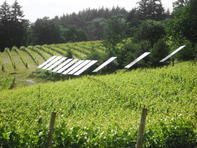Sustainable agriculture is the production of crops and livestock in harmony with nature in order to sustain or preserve natural resources. Ideally, sustainable farming systems achieve a healthy environment, profitability and social fairness.

Conventional farming systems use external inputs such as chemical pesticides, fertilisers and medicines, which pollute and degrade the resources needed to continue producing food for future generations. These resources include fresh water, healthy soil, clean air and biodiversity - a variety of plants and animals working together to create a healthy environment.
To change from conventional to sustainable farming, farmers can adopt any of a range of sustainable agriculture approaches. Below is a short description of sustainable farming systems.
Organic Farming
The global organisation, International Federation of Organic Agriculture Movements (IFOAM), base organic farming on four principles - that of health, fairness, care and ecology.
Organic farming relies on ecological processes, biodiversity and natural cycles adapted to local conditions, rather than using chemical inputs such as pesticides, growth hormones and antibiotics. Practical applications of organic farming include crop rotations, planting of cover crops and encouraging natural and balanced host-predator relationships.
Organic products have official certification.
What is Agroecology?
The term ‘agro-ecologia’ originated in Latin America and refers to what the rest of the world calls ‘organic agriculture’. Agroecology is employed as both an alleviating and adaptation strategy for climate change.
Many people see agroecology as the philosophy and research field behind alternative sustainable farming, complemented by organic farming as the practical aspect of this.
What is Biodynamic Agriculture?
Biodynamic agriculture is based on the work of Austrian scientist and philosopher Dr Rudolf Steiner. His approach to farming envisioned the interdependent elements and relationships of the soil, animals, plants and humans to form a living organism.
This philosophy sees the earth and farm as a living organism that also reflects the ecology of the entire universe. Core concepts of biodynamic farming are the building and maintenance of biodiversity and a living soil. Biodynamic farmers in South Africa must obtain organic certification first and then apply for biodynamic certification through Demeter.
What is Conservation Farming?
Conservation farming is a resource-saving agricultural approach and focusses on three principles. The first is minimum mechanical soil disturbance, at least 30% organic soil cover and creating a diversity of species through crop rotations (annual crops) or companion planting (perennial crops).
The movement started in North and South America, New Zealand and Australia and has since spread worldwide including Africa.
Fair Trade Farming
The ‘Fair Trade’ movement started in the 1970s with coffee farmers in Mexico. The ‘Fair Trade’ trading initiative ensures fair trading conditions and guarantees better prices for small-scale producers.
In practice, ‘Fair Trade’ producers sell their products at predefined and guaranteed prices and receive an additional premium on the price.
This premium is paid to the group of producers and can be used for community development. Products labelled with the ‘Fair Trade’ logo means that producers and traders have both met the ‘Fair Trade’ standards.
What does Permaculture Mean?
The term and philosophy ‘permaculture’ was developed in the 1970s by two Australian biologists. Permaculture refers to an integrated agricultural system that mimics nature, where all processes are in harmony. ‘In a forest there is no weeding, spraying of bugs, tilling and ploughing, yet it manages to feed all that live there.’
The ethics of permaculture are care of the earth, care of the people and sharing - of products, knowledge and resources. Permaculture uses techniques from organic agriculture, sustainable forestry, horticulture and the resource management systems of indigenous peoples.
By Marinda Louw